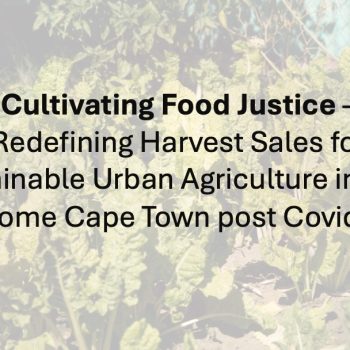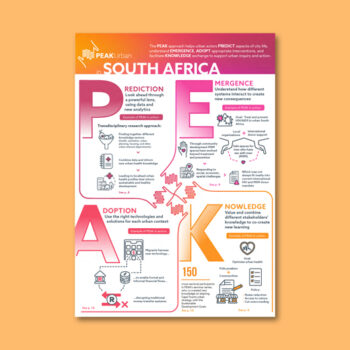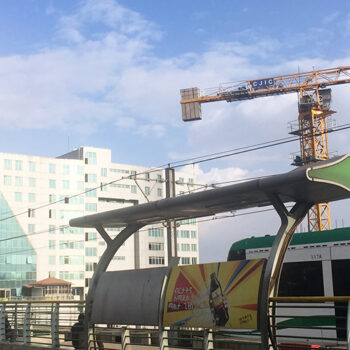Bio
Nobukhosi Ngwenya is involved in teaching with Prof Edgar Pieterse on both the Master of Sustainable Urbanism (MSU) and the Master of Sustainable Urban Practice (MSUP) programmes. Her research interests are centred on urban morphology, with a particular focus on community-led planning, development and transformation of human settlements in South Africa. As an urban planner and community development practitioner, Nobukhosi has worked extensively with communities and community organisations providing innovative solutions to some of the most pressing challenges faced by residents living in informal settlements.
Nobukhosi also has extensive experience developing stakeholder engagement frameworks for projects being implemented in several countries on the continent. Building on earlier work on the drivers of change within Cape Town’s human settlements fabric and her PhD work on the processes of informal land occupation, Nobukhosi’s current work critically examines the human-infrastructure nexus within critical zones. Particular attention is paid to the impact that infrastructure has on material flows and, consequently, the critical zone’s capacity to support habitability in peri-urban areas.
Nobukhosi holds the following degrees: a Bachelor of Social Science (BSocSci) with majors in Psychology and Sociology (UCT); a Bachelor of Arts (Hons) in Development Studies (UCT); a Master of Philosophy (MPhil) in Development Studies (UCT); a Master of City and Regional Planning (UCT), and a Doctor of Philosophy with specialisation in Planning.
PUBLICATIONS
Book Chapters
- Ngwenya, N. (in press). Come Sit for a While. In S. Oldfield, A. Selmeczi & C. Barnett, (Eds.), Knowing the City: Urban Scholarship from Apartheid to Democracy. UKZN Press.
- Ngwenya, N. (2023). The Political Incorrectness of Feminism in the Wake of Calls for Decolonisation in South Africa. In S. Hartman, (Ed.), Reading with Muriel Dimen/Writing with Muriel Dimen: Experiments in Theorising a Field. Oxon: Routledge, pp. 78-82.
- Ngwenya, N. & von Lieres, B. (2021). Silent Citizens and Resistant Texts: Reading Hidden Narratives. In F. Anciano & J. Wheeler, (Eds.), Political Values & Narratives of Resistance: Social Justice and the Fractured Promises of Post-Colonial States. Oxon & NY: Routledge.
Journal Articles
- Ngwenya, N. (2022). Rhodes has Fallen, Now the Work Begins. In K. McClymont, (Ed.), Interface: The Fall of Statues? Contested Heritage, Public Space and Urban Planning, Planning Theory & Practice. https://doi.org/10.1080/14649357.2021.1995255
- Ngwenya, N. & Cirolia, L. (2020). Conflicts between and within: The ‘Conflicting Rationalities’ of Informal Occupation in South Africa, Planning Theory & Practice. https://doi.org/10.1080/14649357.2020.1808237
- Cirolia, L., Ngwenya, N., Christianson, B. & Scheba, S. (2020). Retrofitting, Repurposing, and Re-placing: A Multi-Media Exploration of Vertical Occupation in Cape Town, South Africa, plaNext. https://doi.org/10.24306/plnxt/69
Conference Papers
- Ngwenya, N. (2023). Precarious Assemblages, Selective Inclusion: Enduring Colonial and Apartheid Legacies in Cape Town’s Spatial Form, Urban Inhabitation in the Anthropocene, 25 – 27 April.
- Ngwenya, N. (2021). ‘Unlearning within the Canon: A Critical Reflection on Navigating ’Western’ Theory’s Eurocentricism in the Global South’, Dislocating Urban Studies: Rethinking, Shifting Practice, Online, 18-19 February.
- Ngwenya, N. (2021b). Redefining Housing in Cape Town for a Post-Pandemic World, Royal Geographic Society-Institute of British Geographers Annual International Conference, 31 August – 3 September.
- Ngwenya, N. (2021c). Representing Occupation Practices in Cape Town, South Africa: An Initial Reflection, Royal Geographic Society-Institute of British Geographers Annual International Conference, 31 August – 3 September.
- Ngwenya, N. (2021d). The Politics of Possibilities in Cape Town’s Empty Buildings: The Case of Woodstock Hospital, Cape Town, “Emptiness: Ways of Seeing” Conference, Online, 29 September – 1 October.
Reports/Working Papers/Policy Briefs
- Ngwenya, N. (2022a). Overview of Land Access in Cape Town and Nairobi – Background Paper.
- Ngwenya, N. (2022b). Beyond Greenfield Development: Addressing Cape Town’s Housing Backlog through Retrofitting and Repurposing Vacant Buildings (Policy Brief). PEAK Urban. https://www.peak-urban.org/sites/default/files/2022-06/beyond_greenfield_development_peak_briefing.pdf
Other Outputs
- Ngwenya, N. (15 July 2011). High time young women stopped window-dressing and spoke up, Cape Argus. Cape Town: Independent Newspaper Group.
- Ngwenya, N. (August 29, 2011). Identifying the struggle for our generation. Available: http://www.thoughtleader.co.za/oneyoungworld/2011/08/29/identifying-the-struggle-for-our-generation.
- Rabkin, N.N., Rosenberg, M., Ngwenya, N., Petersen, A., Kay, N., van der Berg, H., Shaikh, M., East, C., Chitapi, S., Maritz, A., Kritzinger, M., Kaplan, J., Jackson, M., Myers, L., LEtang, Harding, J., Dayaram, C., Torien, T. (31 July 2013). Housing is important but not at the expense of the environmental value of Philippi. Cape Times. Cape Town: Independent Newspaper Group.
- Ngwenya, N. (March 13, 2014). Still a long way to go for young women in Zimbabwe. Available: http://www.oneyoungworld.com/blog/still-long-way-go-young-women-zimbabwe.
- Ngwenya, N. (April 2014). 20 years on, it’s still a long way to go for city planning in South Africa. Available: http://www.supersteelafrica.com/2014/04/20-years-on-it-still-long-way-to-go-for.html
- Cirolia, L., Ngwenya, N. & Christianson, B. (2019). Retrofit City-Making: A Multimedia Exploration of Vertical Occupation in Cape Town. Available: https://www.peak-urban.org/blog/retrofit-city-making-multimedia-exploration-vertical-occupation-cape-town.
- Buswala, B., Calderón, E.A. & Ngwenya, N. (2020). 13th de Noviembre, More Than a Date: Some Urban Reflections from Medellíns Comunas. Available: https://www.peak-urban.org/blog/13th-de-noviembre-more-date-some-urban-reflections-medellins-comunas.
- Mokwena, O. (2021). Just Transport Podcast: Space, People and Place with Nobukhosi Ngwenya. 11 March 2021. https://soundcloud.com/hlulanicom/9-space-people-and-place-with




